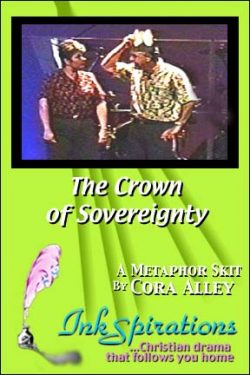-
 These three "Collected Skits" model godly leadership by contrasting "power" and "authority" as leadership styles, celebrating people with diverse abilities to accomplish a task, and presenting God as the ultimate visionary in any project. Excellent for a sermon on biblical leadership.
These three "Collected Skits" model godly leadership by contrasting "power" and "authority" as leadership styles, celebrating people with diverse abilities to accomplish a task, and presenting God as the ultimate visionary in any project. Excellent for a sermon on biblical leadership. -
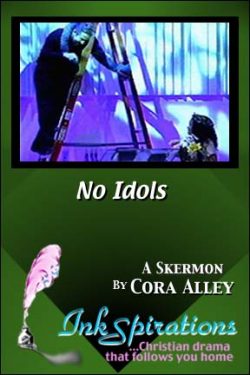 "Idol worship" is the topic of this "Skermon" (skit/sermon). Worship of pleasure, possessions, and status set the stage for the pastor to present a 3-part sermon; one part after each vignette illustrating 1John 2:16,17: the "lust of the flesh, lust of the eyes and the boastful pride of life."
"Idol worship" is the topic of this "Skermon" (skit/sermon). Worship of pleasure, possessions, and status set the stage for the pastor to present a 3-part sermon; one part after each vignette illustrating 1John 2:16,17: the "lust of the flesh, lust of the eyes and the boastful pride of life." -
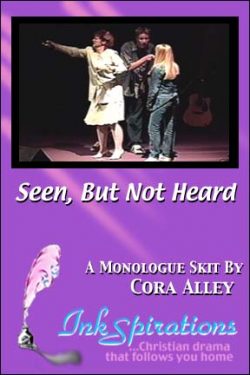 Three monologues seek peace in problem relationships A single mom copes with disappointment; another with allegiances in her blended family; a husband tries to re-connect with his wife; each one sets up a sermon on forgiveness and the power of God to establish healthy relationships.
Three monologues seek peace in problem relationships A single mom copes with disappointment; another with allegiances in her blended family; a husband tries to re-connect with his wife; each one sets up a sermon on forgiveness and the power of God to establish healthy relationships. -
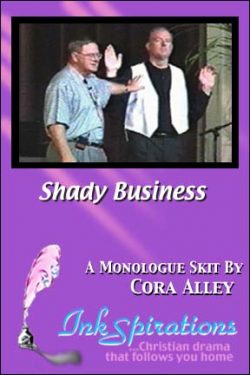 Chris puts greed over integrity and delivers this monologue after failing to wear the Armor of God. Six men shadow him, representing the parts of the Armor of God, setting up a sermon on the power of greed to take over our Christian value system and the importance of wearing the armor of God.
Chris puts greed over integrity and delivers this monologue after failing to wear the Armor of God. Six men shadow him, representing the parts of the Armor of God, setting up a sermon on the power of greed to take over our Christian value system and the importance of wearing the armor of God. -
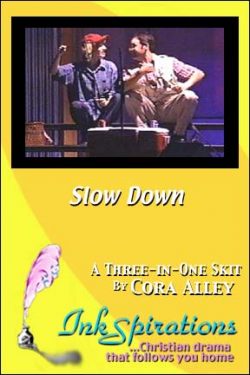 This Three In One Skit presents chaos in traffic, chaos at home, and chaos at work, all set against the background of a calm song that tells us to slow down and quiet ourselves. This skit sets up a series of contrasts between chaos and calm for a sermon on the peace of God.
This Three In One Skit presents chaos in traffic, chaos at home, and chaos at work, all set against the background of a calm song that tells us to slow down and quiet ourselves. This skit sets up a series of contrasts between chaos and calm for a sermon on the peace of God. -
 In this Monologue Skit, Solomon laments the emptiness of wealth, lust, and power; all of which lead to vanity. He sets up a sermon on the dangers of turning wealth, status, and physical pleasure into idols. Spiritual hunger is only satisfied by a Christian life wholly devoted to God's priorities.
In this Monologue Skit, Solomon laments the emptiness of wealth, lust, and power; all of which lead to vanity. He sets up a sermon on the dangers of turning wealth, status, and physical pleasure into idols. Spiritual hunger is only satisfied by a Christian life wholly devoted to God's priorities. -
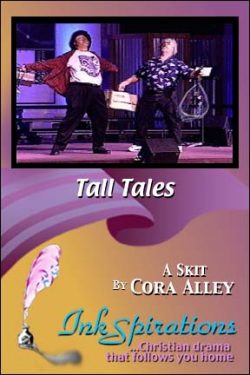 "Truth always wins out" is the theme of this skit. Fred wants to tell a "fish tale" to explain why they didn't catch any fish, but Bob can't seem to get the "alternate truth" straight. An hilarious "Abbott & Costello-like" dialogue proves that a lie is not only wrong, but it never works.
"Truth always wins out" is the theme of this skit. Fred wants to tell a "fish tale" to explain why they didn't catch any fish, but Bob can't seem to get the "alternate truth" straight. An hilarious "Abbott & Costello-like" dialogue proves that a lie is not only wrong, but it never works. -
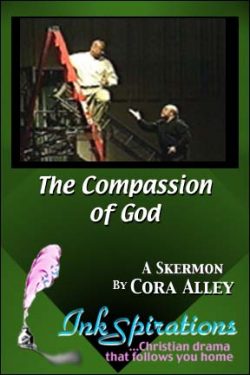 This "Skermon" (skit/sermon) is a picture of God's compassion, with God speaking from atop a ladder while Abraham and Jonah speak from the floor. In both cases, God shows compassion for the righteous. The pastor narrates from the base of the ladder, then preaches on evangelism.
This "Skermon" (skit/sermon) is a picture of God's compassion, with God speaking from atop a ladder while Abraham and Jonah speak from the floor. In both cases, God shows compassion for the righteous. The pastor narrates from the base of the ladder, then preaches on evangelism. -
 In this skit, Joe learns a lesson in leadership skills: getting the diverse members of "the body of Christ" to work together. He would rather use a few men than include the inept volunteers on his building project team; his servant leadership grows. (Second of three skits; can stand alone.)
In this skit, Joe learns a lesson in leadership skills: getting the diverse members of "the body of Christ" to work together. He would rather use a few men than include the inept volunteers on his building project team; his servant leadership grows. (Second of three skits; can stand alone.) -
 Three pleas for healing in the "valley of the shadow of death" are the subjects of these three Christian Drama Monologues. Each one sets the stage for a sermon on trusting God to be our constant companion in the "valleys" of life and not leaning on our own understanding.
Three pleas for healing in the "valley of the shadow of death" are the subjects of these three Christian Drama Monologues. Each one sets the stage for a sermon on trusting God to be our constant companion in the "valleys" of life and not leaning on our own understanding. -
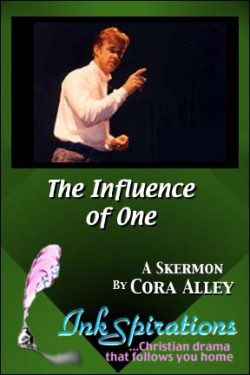 This "Skermon" (skit/sermon) is a living picture of one person's influence on the life path of another. The pastor comments during a freeze in the action as one person moves from the one who influenced him, to the next person whose life he is about to change. The sermon is in three parts.
This "Skermon" (skit/sermon) is a living picture of one person's influence on the life path of another. The pastor comments during a freeze in the action as one person moves from the one who influenced him, to the next person whose life he is about to change. The sermon is in three parts. -
 This "Fractured Parable" is a testimony to God's faithfulness to forgive those who repent and return to Him with a pure heart. It sets up a message on the compassion of God and chastises those who decide that sinners should be shunned, as the "older brother" advises.
This "Fractured Parable" is a testimony to God's faithfulness to forgive those who repent and return to Him with a pure heart. It sets up a message on the compassion of God and chastises those who decide that sinners should be shunned, as the "older brother" advises. -
 This "Fractured Parable" presents a hilarious retelling of Jesus' parable of the "Sheep and the Goats." Jesus places such extreme importance on ministering to the needy that He puts Himself in the position of the one in need. When we minister to the needy, we ministry to Jesus himself.
This "Fractured Parable" presents a hilarious retelling of Jesus' parable of the "Sheep and the Goats." Jesus places such extreme importance on ministering to the needy that He puts Himself in the position of the one in need. When we minister to the needy, we ministry to Jesus himself. -
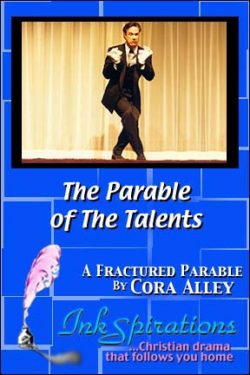 This "Fractured Parable" emphasizes the importance of using our God-given resources to increase His kingdom. It is an excellent introduction for a message on stewardship and the rewards for using our gifts to their potential, or the punishment for squandering them.
This "Fractured Parable" emphasizes the importance of using our God-given resources to increase His kingdom. It is an excellent introduction for a message on stewardship and the rewards for using our gifts to their potential, or the punishment for squandering them. -
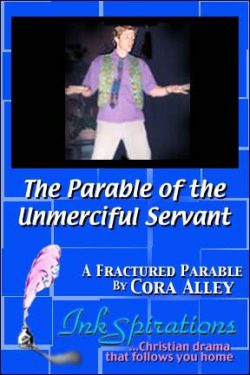 This "Fractured Parable" emphasizes the importance of forgiving others, just as God has forgiven us through Christ. It is an excellent introduction for a message on the importance of showing mercy to one another and the result of harboring hatred.
This "Fractured Parable" emphasizes the importance of forgiving others, just as God has forgiven us through Christ. It is an excellent introduction for a message on the importance of showing mercy to one another and the result of harboring hatred. -
 This "Dream Skit" presents a beautiful portrait of a man who professes outward holiness, but the outward picture changes as the inward man compromises his integrity. This eerie portrait reverses when the man repents and sets up a message on unfailing Christian integrity.
This "Dream Skit" presents a beautiful portrait of a man who professes outward holiness, but the outward picture changes as the inward man compromises his integrity. This eerie portrait reverses when the man repents and sets up a message on unfailing Christian integrity. -
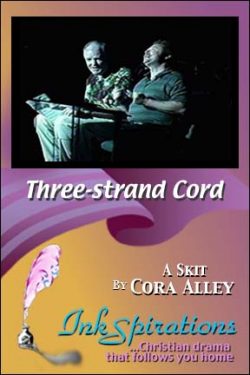 In this short skit on church leadership, Joe discovers that God's presence is the most significant contribution to any team. God's power carries out His vision through people, and His strand is the most significant in Ecclesiastes 4:12. (Third of three skits, but it can stand alone.)
In this short skit on church leadership, Joe discovers that God's presence is the most significant contribution to any team. God's power carries out His vision through people, and His strand is the most significant in Ecclesiastes 4:12. (Third of three skits, but it can stand alone.) -
 In this Monologue Skit, Carl blames others for his interpersonal relationship problems. He thinks everyone is rotten to the core and that life is unfair. He sets the stage for a sermon on humility, compassion, and seeing people through God's eyes.
In this Monologue Skit, Carl blames others for his interpersonal relationship problems. He thinks everyone is rotten to the core and that life is unfair. He sets the stage for a sermon on humility, compassion, and seeing people through God's eyes.


